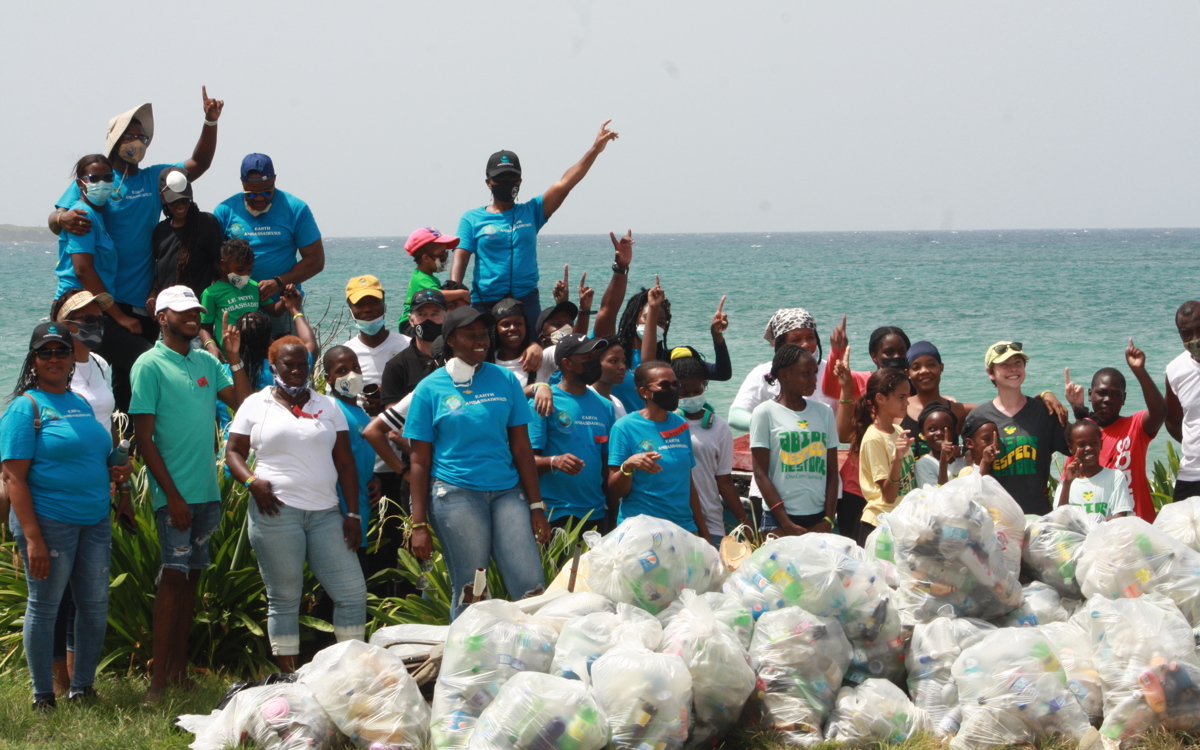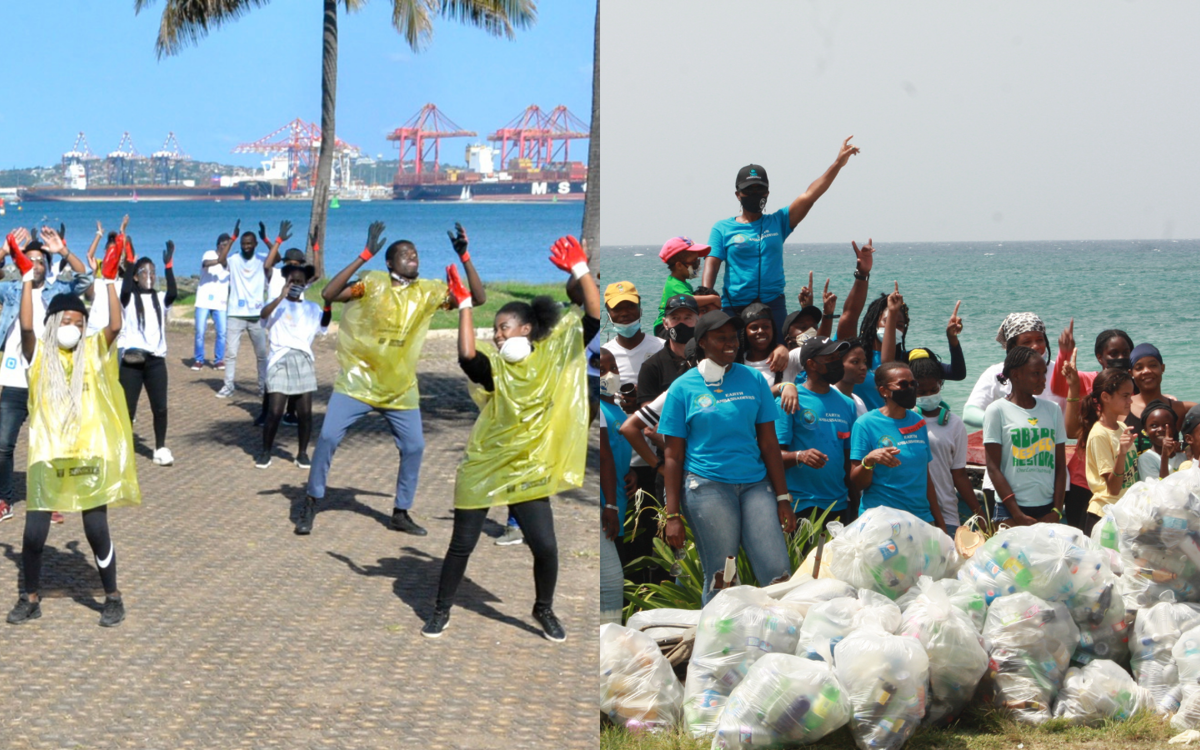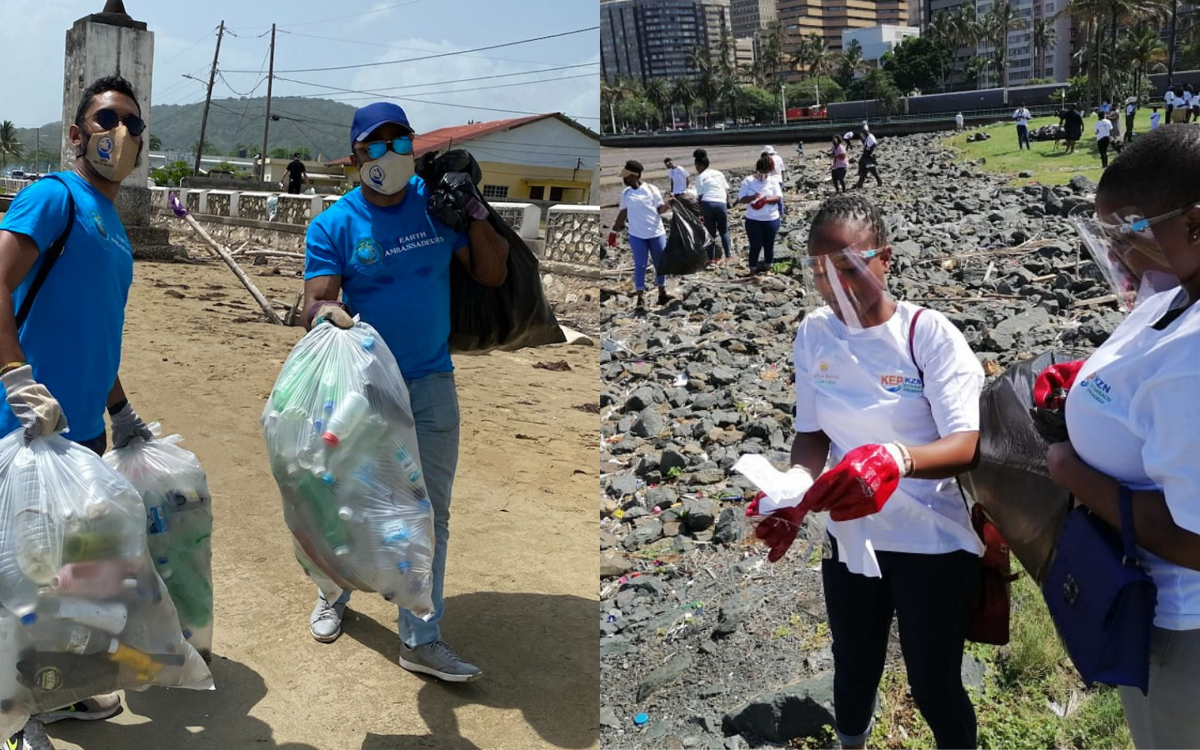By Dr Andrea Clayton & Dr Refilwe Precious

Last month, Climate Cohort members Dr Andrea Clayton (Caribbean Maritime University, Jamaica) and Dr Refilwe Precious Mofokeng (University of KwaZulu-Natal, South Africa) came up with a brilliant idea: they would join forces to coordinate a trans-continental beach cleaning event in their home countries of Jamaica and South Africa. Uplifted by music, dance, community, and a strong sense of purpose, two diverse groups of volunteers came together under a shared mission to clean up the oceans.
In this collaborative blog, Andrea and Refilwe discuss the importance of beach cleans and how they motivated their fellow citizens to join the fight against marine plastic pollution.


Beach Cleaning: One way to help save the ocean
By Dr Andrea Clayton and Dr Refilwe Precious Mofokeng
Our oceans play a fundamental role in mitigating climate change by serving as a major heat and carbon sink. An estimated 83% of the global carbon cycle is circulated through marine waters, which cover 71% of our planet’s surface. The oceans provide a life-support system which includes the food we eat and the oxygen we breathe; they also regulate the global climate.
However, human activity is impacting on the oceans in many ways. Marine litter, particularly plastic, is one of the ways that we are harming marine life. At least 8 million tons of discarded plastic enter our oceans each year, and this volume of plastic waste is expected to double by 2030.
In Jamaica, approximately 30,000 tons of residential plastic waste ends up in drains, rivers, gullies, beaches and, ultimately, the ocean. In South Africa, 84% of plastic waste is sent to landfills where they end up in rivers and eventually end up in the ocean.
Plastic chokes and smothers marine animals and habitats and can take many decades to break down. Plastic waste slowly disintegrates into microplastics, which are dispersed and ingested by marine animals, including plankton. These tiny powerhouses play a critical role in taking carbon dioxide from the atmosphere and water and sequestering it in deep ocean sinks.
Additionally, plastic blocks sunlight from getting to the plankton, which then prevents the organism from being able to photosynthesize and thereby oxygenate the ocean (the organism produces oxygen as a byproduct of photosynthesis). Without sunlight, plankton dies, and that leads to suffocation and de-oxygenation of the oceans -resulting in dead zones.
Why do we need beach cleans?
Both Jamaica and South Africa are impacted by poor waste management systems and behavioral patterns which contribute to plastic getting into the ocean. Eventually, the plastic waste breaks down into methane and ethylene, which increase the rate of climate change.
Therefore, it is essential to reduce the amount of litter that enters our oceans. Our beach cleaning activities address the problem from two angles: we remove the plastic from the shoreline to reduce the amount reaching the ocean, and we educate citizens about how our waste affects marine life.
At each beach cleaning activity, data is collected so that we can track and assess the types of waste that end up in the ocean. This then allows us to further educate citizens about how to moderate their use of plastic and reduce the amount of waste they generate.
The infographics below show the data collected from the Durban (Figure 1) and Port Maria (Figure 2) beach cleans, including the quantities and types of beach waste the volunteers collected.

What comes next?
Andrea: The Jamaican clean-up initiatives are being driven by our Earth Ambassadeurs, a group of volunteers committed to using education and citizen science to stimulate behavioural change and improve how we treat the environment. We engage with the community and invest time to understand their needs, before arranging knowledge exchange sessions with select community members who can become agents of change in the area. Our plan is to build groups of ‘Community Ambassadeurs’ across the island.
Additionally, we are expanding our Junior Ambassadeurs Programme in the upcoming academic year. The programme uses education at the primary school level to create a community of environmental stewards by integrating its curricula into the schools’ activities. The long-term objective is the implementation of a national policy for schools, designed to reduce waste generation and ultimately reduce the possibility for marine litter.
As a follow-up to Port Maria’s clean-up, later this month we will also be donating bins to the Pagee Beach seaside community which currently does not have receptacles for waste. We are also attempting to create a GIS mapping of the island using the data we’re collecting, and two additional clean-up activities have been scheduled for the rest of the year. It will take a while to cover all 14 parishes of Jamaica, especially as this is all volunteer work, but the team is highly motivated and very optimistic.

Refilwe: The third wave of COVID-19 in South Africa has put a hold on some of our planned activities. We have, however, already had three cleanups in 2021 and are planning the last one for the year in Cape Town.
We are currently visiting radio and TV stations to promote marine health and influence behavioral change. We are also working with an art center to build a whale sculpture that 'consumes plastics’, which we aim to use as an educational tool and recycling hub for collectors. In addition, we want to establish an upcycling workshop where young people can turn plastics into other usable materials and sell them for profit.

Finally, we are both working together to produce a documentary on ocean pollution which will focus on the impact of litter – and primarily plastics – on the marine environment. The documentary will also examine how plastic debris affects the biology and overall function of the ocean, and subsequently, the implications for climate change as the ocean's ability to absorb CO2 and produce oxygen is impacted.
Make sure to stay tuned for the release!
Watch Refilwe and the Durban beach clean team dance to Master KG's 'Jerusalema' to mark yet another a successful beach clean event.
